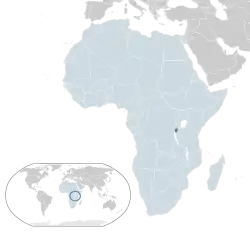Burundi
Burundi (officially called the Republic of Burundi) is a small country in Africa. The capital of Burundi is Gitega. The official languages of Burundi are Kirundi, French and English. There are about eight and a half million people in Burundi. Burundi is one of the poorest countries in the world.
Republic of Burundi
| |
|---|---|
 Coat of arms
| |
Motto:
| |
| Anthem: Burundi Bwacu (Kirundi) Our Burundi | |
.svg.png.webp)  | |
| Capital | Gitega (political)
Bujumbura (economic)[lower-alpha 1] 3°30′S 30°00′E |
| Largest city | Bujumbura[lower-alpha 1] |
| Official languages | Kirundi & Swahili (national and official) French (official) English (official)[1][2][3][4] |
| Ethnic groups ([5]) | |
| Religion (2015)[6] |
|
| Demonym(s) | Burundian |
| Government | Unitary dominant-party presidential constitutional republic |
| Évariste Ndayishimiye | |
| Gervais Ndirakobuca | |
• Vice-President | Prosper Bazombanza |
| Legislature | Parliament |
| Senate | |
| National Assembly | |
| Status | |
| 1945–1962 | |
• Independence from Belgium | 1 July 1962 |
• Republic | 28 November 1966 |
• Constitution of Burundi | 28 February 2005 |
| Area | |
• Total | 27,834 km2 (10,747 sq mi)[7] (142nd) |
• Water (%) | 10[8] |
| Population | |
• 2020 estimate | 11,865,821[9] (84th) |
• 2008 census | 8,053,574[7] |
• Density | 401.6/km2 (1,040.1/sq mi) (20th) |
| GDP (PPP) | 2019 estimate |
• Total | $8.380 billion |
• Per capita | $727[10] |
| GDP (nominal) | 2019 estimate |
• Total | $3.573 billion |
• Per capita | $310[10] |
| Gini (2013) | 39.2[11] medium |
| HDI (2018) | low · 185th |
| Currency | Burundian franc (FBu) (BIF) |
| Time zone | UTC+2 (CAT) |
| Date format | dd/mm/yyyy |
| Driving side | right |
| Calling code | +257 |
| ISO 3166 code | BI |
| Internet TLD | .bi |
History
In 1962, Burundi gained independence from Belgium.[13]
Provinces, communes and collines
Burundi is divided into 18 provinces, 117 communes, and 2,638 collines (hills).[14] Provincial governments are based on these boundaries. In 2000, the province encompassing Bujumbura was separated into two provinces, Bujumbura Rural and Bunjumbura Mairie.[15]
The provinces are:
Geography
One of the smallest countries in Africa, Burundi is landlocked. It is bordered by Rwanda to the north, Tanzania to the east and south and the Democratic Republic of the Congo to the west. It has an equatorial climate. Burundi is a part of the Albertine Rift, the western extension of the East African Rift.
The country lies on a rolling plateau in the center of Africa. The average elevation of the central plateau is 5,600 feet (1,707 m), with lower elevations at the borders. The highest peak, Mount Heha at 8,810 feet (2,685 m),[16] is southeast of Bujumbura. The source of the Nile River is in Burundi province. It is linked from Lake Victoria to its headwaters by the Ruvyironza River.[17] Lake Victoria is also an important water source. It serves as a fork to the Kagera River.[18][19] Another major lake is Lake Tanganyika in Burundi's southwestern corner.[20]
Burundi's lands are mostly agricultural or pasture. Settlement by rural populations has led to deforestation, soil erosion, and habitat loss.[21]
There are two national parks: Kibira National Park and Ruvubu National Park. Both were formed in 1982 to keep wildlife populations.[22]
References
- "What Languages Are Spoken In Burundi?". August 2017. Archived from the original on 13 March 2018. Retrieved 12 March 2018.
- "English is now official language of Burundi". Archived from the original on 14 February 2018. Retrieved 12 March 2018.
- "Analyse et adoption du projet de loi portant Statut des Langues au Burundi - Assemblée Nationale du Burundi". Assemblée Nationale du Burundi. Archived from the original on 13 March 2018. Retrieved 12 March 2018.
- "The impact of English on Kirundi and French in Burundi: Use and attitudes among Burundian students" (PDF). Archived from the original (PDF) on 13 August 2017. Retrieved 12 March 2018.
- "The World Factbook – Burundi". Central Intelligence Agency. 7 August 2018. Archived from the original on 28 January 2018. Retrieved 13 August 2018.
- "Religions in Burundi | PEW-GRF". Archived from the original on 2017-12-04. Retrieved 2020-09-03.
- "Quelques données pour le Burundi" (in French). ISTEEBU. Archived from the original on 28 July 2017. Retrieved 17 December 2015.
- Annuaire statistique du Burundi (PDF) (Report) (in French). ISTEEBU. July 2015. p. 105. Archived from the original (PDF) on 7 June 2016. Retrieved 17 December 2015.
- CIA – The World Factbook – Burundi Archived 28 January 2018 at the Wayback Machine CIA. Retrieved 8 June 2008.
- "Report for Selected Countries and Subjects : Burundi". International Monetary Fund. Retrieved 20 February 2020.
- "Gini Index, World Bank Estimate". World Development Indicators. The World Bank. Archived from the original on 26 June 2015. Retrieved 13 January 2015.
- "Human Development Report 2019". United Nations Development Programme. 10 December 2019. Archived from the original (PDF) on 30 April 2020. Retrieved 10 December 2019.
- "Burundi profile - Timeline". BBC News. 2018-12-03. Retrieved 2021-05-06.
- Kavamahanga, D. Empowerment of people living with HIV/AIDS in Gitega Province, Burundi Archived 2008-12-10 at the Wayback Machine. International Conference on AIDS 2004. July 15, 2004. NLM Gateway. Retrieved on June 22, 2008.
- Eggers, E., Historical Dictionary of Burundi, p. xlix.
- O'Mara, Michael. Facts about the World's Nations. Bronx, New York: H.W. Wilson, 1999. p. 150. ISBN 978-0-8242-0955-1
- Ash, Russell (2006). The Top 10 of Everything 2007. Sterling Publishing Company, Inc. ISBN 978-0-600-61557-6.
- Klohn, Wulf and Mihailo Andjelic. Lake Victoria: A Case in International Cooperation. Food and Agriculture Organization of the United Nations. Retrieved on July 20, 2008.
- Budge, E. A. Wallace, The Egyptian Sudan: Its History and Monuments. Philadelphia, Pennsylvania: J.P. Lippincott Company, 1907. p. 352.
- Jessup, John E., An Encyclopedic Dictionary of Conflict and Conflict Resolution, 1945–1996, p. 97.
- Bermingham, Eldredge; Dick, Christopher W.; Moritz, Craig (2005). Tropical Rainforests: Past, Present, and Future. University of Chicago Press. p. 146. ISBN 0-226-04468-8.
- East, Rod (1999). African Antelope Database 1998. IUCN. p. 74. ISBN 978-2-8317-0477-7.
Notes
- While Gitega has been established as the political capital, Bujumbura is still the seat of the government and economic capital.

.svg.png.webp)